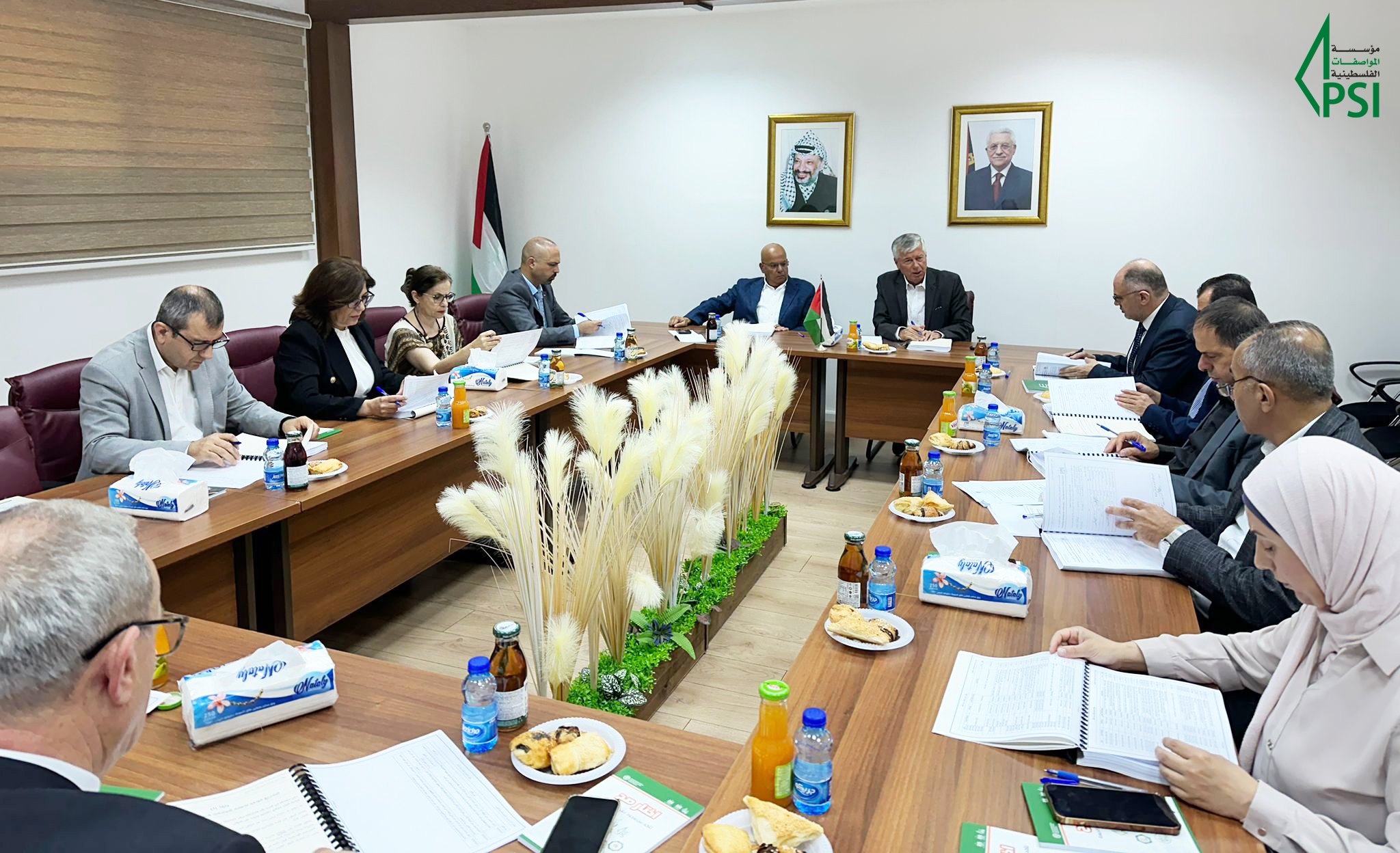"The Standards and Metrology Board Approves and Updates 242 New Standards."

The Third Meeting of the Board of Directors of the Palestinian Standards and Metrology Institution for 2024 was held today, chaired by His Excellency Minister of Industry and Chairman of the Board, Mr. Arafat Asfour, with the attendance of the Vice Chairman of the Board and President of the Palestinian Federation of Industries, Mr. Nassar Nassar, and the General Director of the Institution, Eng. Haider Hajjeh.
During this meeting, several important topics were discussed, focusing on their implementation and execution to advance the national industry and enhance its competitiveness in both local and international markets.
In its third session, the Board approved 18 new Palestinian standards and updated 224 Palestinian standards covering sectors such as construction products, cosmetics, food products, textiles and clothing, medical devices and supplies, metallic materials, electrotechnical products, agricultural products and crops, petroleum derivatives, surfactants, paints and varnishes, plastics, furniture, personal protective equipment, machinery, vehicles and their accessories, plastic pipes, tobacco, and its products.
The Board ratified 87 Palestinian standards after review, confirmed the continuation of validity for 79 standards as recommended by the standardization committees, and approved the cancellation of 8 standards based on committee recommendations following five years of implementation according to the standard preparation guidelines.
Since the beginning of this year, various standardization committees have completed reviewing 822 Palestinian standards, referring 596 of them for updating or renewal.
The Board also recommended specifying the competent authorities responsible for inspection and enforcement of mandatory technical regulations. It designated the Ministry of National Economy and the Ministry of Industry as the competent bodies to oversee enforcement of Mandatory Technical Regulation No. (112-2024) concerning environmentally considerate design requirements for refrigeration devices (refrigerators), each within their jurisdiction.
Additionally, the Board recommended the Ministry of Health and the Ministry of National Economy as responsible for inspection and enforcement of several amended mandatory technical regulations, including:
-
Regulation No. (113-2024) amending Regulation No. (50-2015) on nutritional and health claims.
-
Regulation No. (114-2024) amending Regulation No. (45-2014) concerning dietary supplements.
-
Regulation No. (115-2024) concerning foods for infants, young children, foods for special medical purposes, and weight control diets.
-
Regulation No. (116-2024) specifying composition and labeling requirements for infant, follow-up, and young child formulas.
-
Regulation No. (117-2024) on composition and information requirements for infant, young child foods, and cereal-based foods.
-
Regulation No. (118-2024) concerning composition and labeling of foods for special medical purposes.
-
Regulation No. (119-2024) regarding composition and labeling of products used as weight control diets.
The Board approved a draft cooperation agreement with Hebron University to enhance technical and scientific collaboration, training, testing, calibration, and exchange of expertise.
It also discussed ways to support and develop the footwear and leather industries, including enforcing mandatory technical regulations on footwear and leather products. Plans were made for a visit by the Chairman of the Board and Minister of Industry to private sector institutions to assess the sector’s situation, discuss enforcement mechanisms for footwear regulations, review test results, assist manufacturers in marketing their products, and enable their participation in local and international exhibitions.
At the end of the session, the Board reviewed the cumulative report for the second quarter of the 2024 executive plan and commended the Institution’s achievements amid the challenging conditions faced by the country. During the first half of the year, the Institution’s teams issued 150 new standards and reviewed 696 standards. Regarding certification, 69 files were followed up, 62 certificates were renewed, and 7 certificates were newly granted. The Institution conducted 239 routine inspections of factories holding its quality marks, issued 383 certificates of conformity for local and imported products, performed 994 technical tests on fire-resistant doors, 352 elevator inspections, verified 1,556 fuel meters, and checked 293 commercial scales.
Finally, the Board recommended submitting a request to the Council of Ministers to mandate the use of national products in government procurements, projects, municipalities, and village councils, and urged the establishment of enforcement mechanisms for mandatory technical regulations.